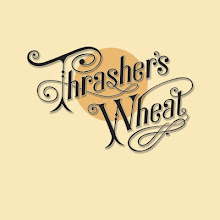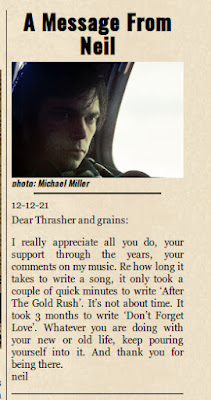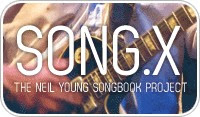1977 Review: Neil Young - AMERICAN STARS 'N' BARS
As Neil Young's 2017 sabbatical continues, we've been plowing deep into the Thrasher's Wheat Archives Vaults.
Here's a look back at Neil Young's 1977 album American Stars 'N Bars by PAUL NELSON, originally published in Rolling Stone on Aug 11, 1977:
AMERICAN STARS 'N' BARSFor more, see American Stars 'N Bars - Neil Young Albums In Order and American Stars-n-Bars Shines in Spain.
Right now, I think it would be just about impossible to overrate Neil Young.
In the last few years he has web the most avant-garde styles to the corniest of archetypes-and deliberately ignored the public's penchant for pasteurized product by rampantly (im)perfecting Bob Dylan's crude but spontaneous recording technique. Seething with psychic dynamite, his raw and passionate electric-guitar playing boasts a tactility and uniqueness unmatched by any guitarist since Jimi Hendrix. Young has written songs as sensitive and beautifulas any by the most fragile and aesthetic singer/songwriter, yet he has played life-and-death rock & roll with the delirious ferociousness of the Rolling Stones at their most sordid and seedy. Of course, he has been misunderstood too quickly.
Since After the Gold Rush (1970) and Harvest (1972), many erstwhile admirers have filed strong charges of morbid self-indulgence and drugged-out incomprehensiveness against the later LPs. In The Rolling Stone Illustrated History of Rock & Roll, Janet Maslin wrote: "With On the Beach, 1974, Tonight's the Night and Zuma, both from 1975, Young's progressively more rudimentary music did little more than reiterate the murkiness of his lyrics. His renunciation of artifice was so absolute it left him no room for either drama or tension." In the New York Times, John Rockwell, in a highly favorable review, characterized Young as "the quintessential hippie-cowboy loner, a hopeless romantic struggling to build bridges out from himself to women and through them to cosmic archetypes of the past and of myth." Well, no.
Unless one understands the "On the Beach"/"Motion Pictures"/"Ambulance Blues" trilogy from On the Beach (and "Don't Be Denied" from Time Fades Away), one simply cannot write intelligently about Neil Young. But when one understands these songs, one begins to perceive the exciting possibility that perhaps Young is rock & roll's first (and only?) postromantic. That he knows something that we don't, but should. Indeed, I suspect that Young took one of the longest journeys without maps on record, never even slowed up at the point of no return, but somehow got back anyway, a better man with all senses intact. When nearly overwhelmed by marital difficulties and the death of friends, he apparently looked into himself and managed an instinctive or willed act of Jungian purification that put him somewhat safely on the far side of paradise, if not paradox. I'm not saying he's happy, but who the hell is happy? For Young, being a postromantic probably means he still loves the war, but knows exactly how and where to invest his combat pay-he may lose it, but never hopelessly.
Romanticism is a foreign country; they do things differently there. It's a nice place to visit, but I wouldn't want to live there. Too homicidal. Having gotten through the more self-destructive aspects of romanticism, Neil Young certainly takes full advantage of his revisiting privileges, pointing out the highlights and contradictions of his itinerary to all who will listen.
Perhaps only a man who has known the answers can really see both sides of the questions. At any rate, Young's Mona Lisa smile from the barroom floor on the curious American Stars 'n Bars isn't so much arrogant ("If you can't cut it/Don't pick up the knife") as it is inclusive ("I know that all things pass/Let's try to make this last"). So inclusive, in fact, that the album can almost be taken as a sampler, but not a summation, of Young's various styles from After the Gold Rush and Harvest (much of the country rock) through On the Beach (the incredible "Will to Love") to Zuma ("Like a Hurricane" is a worthy successor to "Cortez the Killer" as a guitar showcase), with a lot of overlap within the songs.
If one can divide American Stars 'n Bars into major and minor Neil Young, I think that it breaks down this way: "The Old Country Waltz," "Saddle Up the Palomino," "Hey Babe," "Bite the Bullet" and "Homegrown" are excellent examples of country rock at its most pleasant and muscular. While these songs abstain from cloyingness and retain the artist's characteristic idiosyncrasies (Young is nothing if not quirky), they lack the necessary resonance to stand up to the LP's four masterpieces.
In "Hold Back the Tears" and "Star of Bethlehem," two songs about how it feels when you've just been left and didn't want to be, a corrosive view of love metamorphoses into hopefulness ("Hold back the tears and keep on trying/Just around the next corner may be waiting your true love"), with a final metaphor equating the inevitability of the quest for a meaningful relationship with the apotheosis of the religious experience.
Which leads right into the shining "Will to Love," a song that flies into the face of reason by flaunting the seemingly ridiculous-the thoughts of the singer as a salmon swimming upstream-in order to gain the truly sublime. And it works. (When was the last time you heard something like this on record?) Starting with a typical Young epigram ("It has often been my dream/To live with one who wasn't there"), the song moves from the manic to the depressive (the two lines about "a fire in the night") to a combination of both ("Now my fins are in the air/And my belly's scraping on the rocks") before homing in on the universal plight ("I remember the ocean from where I came/Just one of millions all the same ...") and promise (". . . but somewhere someone calls my name").
If Young's triumph is that he will never lose the way to love, his need to locate that special someone can certainly cause tribulations. "Like a Hurricane," with its gale-force guitar playing, is a perfect either/or,
neither/nor description of a modern-day Gatsby caught between the tangible idea of transcendental love and the intangible reality of it. Everything is "hazy," "foggy," lit by "moonbeam" and "the light from star to star."
I am just a dreamer
But you are just a dream
And you could have been anyone to me
Before that moment you touched my lips
That perfect feeling when time just slips
Away between us and our foggy trip
The first three lines imply that the singer's need to invent someone to love may be far greater than the someone he finds. One can infer from the last three lines that the feeling gained from the creation and the chance taken is undoubtedly worth it, no matter what the cost. Is there a happy ending? I don't think so. "I want to love you/But I'm getting blown away," Young sings. It's like Key Largo with feedback.
Although he may be circling in a peculiar and seemingly haphazard manner (some claim he has as many as nine unreleased albums), Neil Young has a very good chance to be the most important American rock & roll artist in the Seventies.
Bruce Springsteen, Jackson Browne and others must be considered, of course, but I don't know anyone who goes after the essences with as much daring as Young. I don't know anyone who finds them like he does either.
PAUL NELSON
(Posted: Aug 11, 1977)
Labels: album, neil young, review
































 Human Highway
Human Highway

















 Concert Review of the Moment
Concert Review of the Moment





 This Land is My Land
This Land is My Land

 FREEDOM In A New Year
FREEDOM In A New Year









 *Thanks Neil!*
*Thanks Neil!*




![[EFC Blue Ribbon - Free Speech Online]](http://www.thrasherswheat.org/gifs/free-speech.gif)











 The Unbearable Lightness of Being Neil Young
The Unbearable Lightness of Being Neil Young Pardon My Heart
Pardon My Heart



 "We're The Ones
"We're The Ones  Thanks for Supporting Thrasher's Wheat!
Thanks for Supporting Thrasher's Wheat!




 This blog
This blog 
 (... he didn't kill himself either...)
#AaronDidntKillHimself
(... he didn't kill himself either...)
#AaronDidntKillHimself









































































 Neil Young's Moon Songs
Neil Young's Moon Songs




 Civic Duty Is Not Terrorism
Civic Duty Is Not Terrorism Orwell (and Grandpa) Was Right
Orwell (and Grandpa) Was Right


 What's So Funny About
What's So Funny About 



16 Comments:
Ehh, Stars-n-Bars is allright, he should have done some studio work with The Ducks. That would have been way more interesting to me.
Lots of lightweight stuff on Stars-n-Bars, pleasant but not mind altering. The studio "Hurricane" pales in comparison to any live version. "Saddle..." and "HBTT" are cool tunes.
The one great exception to all of this, of course, is "Will To Love". One of the great achievements of Neil's studio career. And maybe the greatest moment of the Briggs/Young partnership.......
With all due respect to richiecruz, I love this record. The country rock of side one is awesome because Neil is using a solid body Gretsch guitar with a Bigsby B7 tailpiece. It's the only record he has used this guitar on. You can hear his excitement of using a new guitar. The guitar in Bite the Bullet as example. And as a throwaway song, Hey Babe is one of the best throw away songs ever. Love to sing and play that song. Great vehicle for Ben Keith.
Here's a link to picture of the guitar I am talking about.
http://assets.rollingstone.com/assets/images/gallery/20120920-neil-young-13-x595-1348162649.jpg?vm=r
Of all the recorded versions of "Homegrown" I've heard, I like the Stars 'n Bars version best.
To my ears? It's a good record that musically feels like it's pulling in too many different directions. And therefore is a bit watered down in impact. A strange thing to say about a record that contains both Hurricane and Will To Love.
I actually disagree with Richie about Hurricane; it's true most of my favourite versions are live from 1976 or February-April 1991, but I do love the studio rendition as well. As a side note, that this wasn't actually the "first take", as Neil recollects; in fact, it was just the first take with the synth, instead of rythym guitar. That is Neil rewriting history to justify his modern methodology. But apparently even the lyrics to Hurricane were extensively rewritten from their first draft. In other words, he only got to this masterpiece after numerous failed attempts and a lot of hard work.
In the late-seventies, Neil had a surplus of good songs, more than he knew what to do with. And, for better or worse, that's what it sounds like listening to Stars 'n' Bars.
Scotsman.
What an incredible review. Man, do I miss Paul Nelson; he was the Pauline Kael of music review and such an amazing writer. Take just about any paragraph and pick out a sentence or a phrase--you can get lost in his thinking and absolute love of music.
My favorite line here has to be this gem: "Romanticism is a foreign country; they do things differently there." Yup, that pretty much says what needs to be said. The world is mostly made up of Romantics and Sentimentalists. What's the difference? A Sentimentalist never wants anything to end, while a Romantic sees the end in everything. And of course, Neil is a pure Romantic at heart...me too.
Thanks for posting this great review, and I hope that Neil is having a good time and enjoying every sandwich. It will be nice when he's back performing, but you can't push the river. And meanwhile there's lots of great music out there for everyone to enjoy.
I've been on a long break but have lots of shows coming up in the next few months, including PJ Harvey, Tobin Sprout, Kris Kristofferson and Nick Cave, all leading up to this year's Solid Sound, with the most eclectic lineup yet, including Television. I had a dream recently where they played an instrumental version of Persia that lasted over an hour and took up their entire show. Yeah, that was a good one.
"The world is its own magic."
--Suzuki Roshi
I love this record very much. The female backup singers are incredible, the songs are funny and touching, the diversity of the album is impressive as well. I have seen some side A stuff live and he killed it at the Old Princeton Landing with that material, 4/13/96 I think it was. I cherish this material. There's no accounting for taste. I would take this record over Silver and Gold. I
am enjoying the posts, Thrasher, keep them coming. Long live Neil young! And may we see Archives 2 please? On Blu Ray, thank you.
@ RichieC - Yes, The Ducks! That would be legend if something ever turns up.
Btw, "Will To Love" in the studio? Wasn't that recorded by a fireplace which you can hear? Maybe the same fireplace in the photo we posted the other day from Decade images?
@ Acoustic FeedBack - Hey Babe as a throwaway song? Hmmm. Seems almost essential by now. maybe throw away filler at the time, but time has smiled on the song.
Thanks on link!
Tom - a tasty version of "Homegrown", indeed.
@ Scotsman - good to see you again of late. We were starting to miss you, Topanga, The Dans and all. You mention the range of the album: from the delicate Will To Love to the CAT5 Hurricane.
So, Neil rewriting history? Hmmm. Maybe. But to justify his modern methodology? Still need convincing here. But your point of spending time to get it right back then relative to today is well founded as so many often point out.
@ Mr H. - always a pleasure for you to drop by and fill us in. nice on Paul to music as Pauline to film. Some symmetry of the Pauls.
Neil is a pure Romantic at heart... isn't that wy we're all here?. Could a "sentimentalist" ever do as well? enjoy the shows! We're off to see James McMurtry tonight in a little club. Tift Merritt opening. Should be a good night.
@ Alan - Glad you're enjoying the deep dives here on TW! Tons more to come even if Neil stretches out the sabbatical a few years...
Thrasher,
As far as the recording of "Will To Love" goes, according to Neil in an excerpt from the Shakey biography, Neil recorded himself by the fireplace playing the song on his acoustic (supposedly on a crappy boom box!).
Then Neil and Briggs ended up in a studio, and for one crazy session, Neil overdubbed himself playing all kinds on instruments (bass, electric guitar, vibes, even drums).
So what you hear on the album is a combo of Neil by the fireplace and odd goings on in the studio.
Since the song was never played live, it's possible that Neil's recording of it may have been the ONLY time he ever played the song! Quite amazing when you hear what a jewel of a song it is........
Will To Love was not recorded on a boom box, but a home recording 4-track cassette system.
Thrasher: Yep, it's a thoroughly enjoyable and multi-coloured record, and even the "minor" songs are respectable enough. Any album with Hurricane and Will To Love is going to punch above it's weight!
Re: the mistaken notion that Hurricane was a first take. Maybe "justify his modern methodology" was the wrong phrase. I meant more that he tends to remember that the "first take" method has always been his modus operandi, pointing to it's successes, whereas in reality it's only in recent years that's he's come to trust in it so fully.
Going with the first take is certainly a great idea when the first take produces magic, as it so often did in his prime. And it prevents self-destructive over-thinking, which is a good thing. However, recordings that took there time like Like A Hurricane (and there are many others) demonstrate how, when the song needed that something extra, Neil was willing to go the distance.
With that in mind, would a song as deep and rich as Hurricane be given chance to develop in recent years? Maybe, but I think it's more likely he'd have settled for an early take and the song wouldn't have had chance to grow into the monster we all know and love. There's the sense with some of his recent work of songs being cut off before they've even had chnace to develop into anything, arriving stillborn. But Hurricane is the perfect example of what exciting things can happen when Neil is really commited to doing an idea justice.
Incidentally, is Old Neg still out there? Haven't heard from him for a while.
Scotsman.
Scotsman, I agree with what you are saying here. A modern example would be Greendale. On record, it sounded thin and pale. Live in concert it was booming and alive. If he'd have recorded it later, after the tour, it would have been timeless.
Hey Babe was a little great song. Always loved it.
So Tired.
The original cassette was transferred to a 16 track reel and overdubbed at Indigo.
So Tired.
Signaled through chorus effect for the swimming sound. 8`)
Neil Young and CSN tried to complete Will To Love at Criteria Studios, Miami before the Indigo treatment. To which extent no one knows, but a few of Will To Love tapes are included in the list of the Atlantic masters from those sessions.
So Tired.
Post a Comment
<< Home